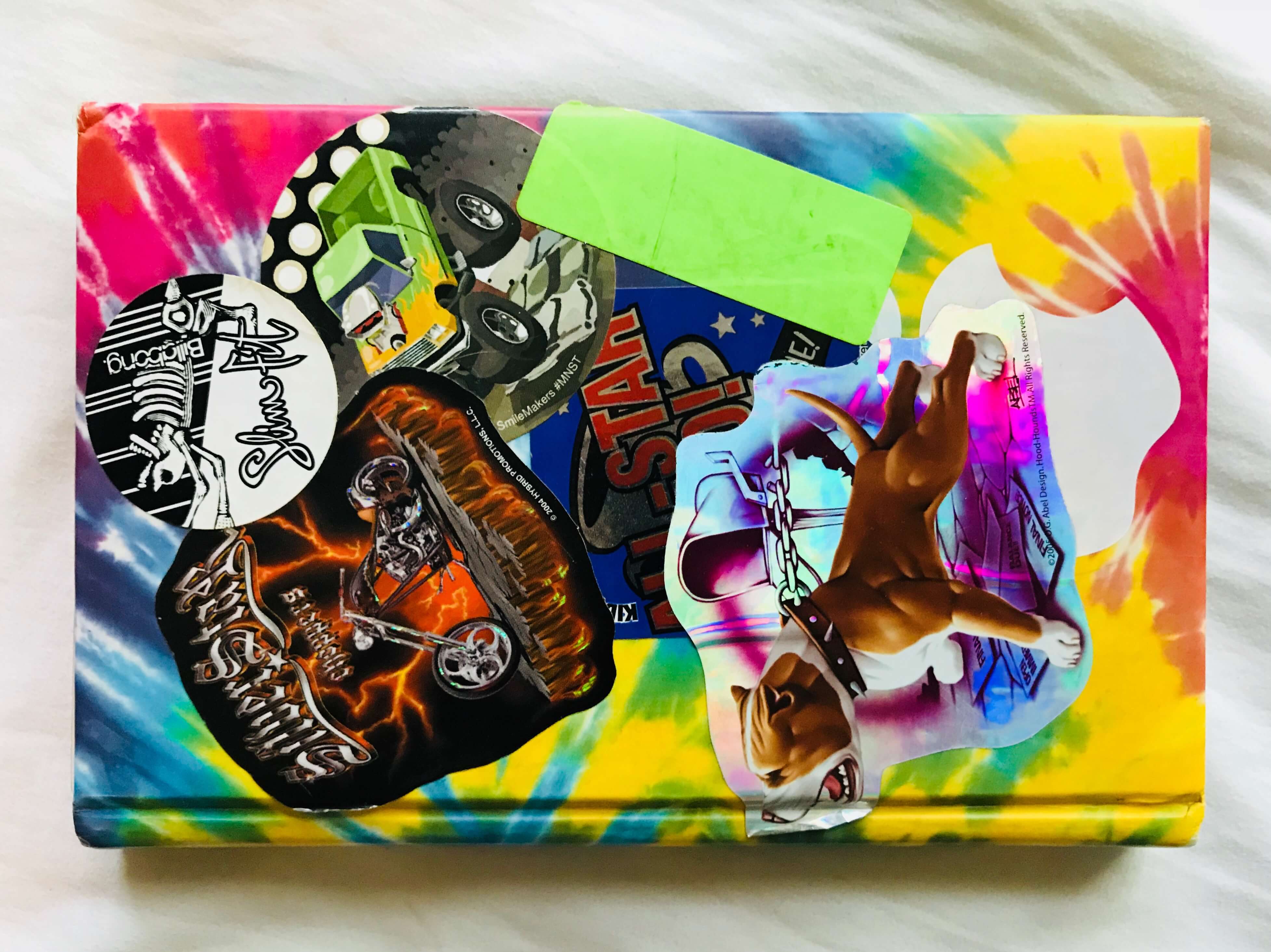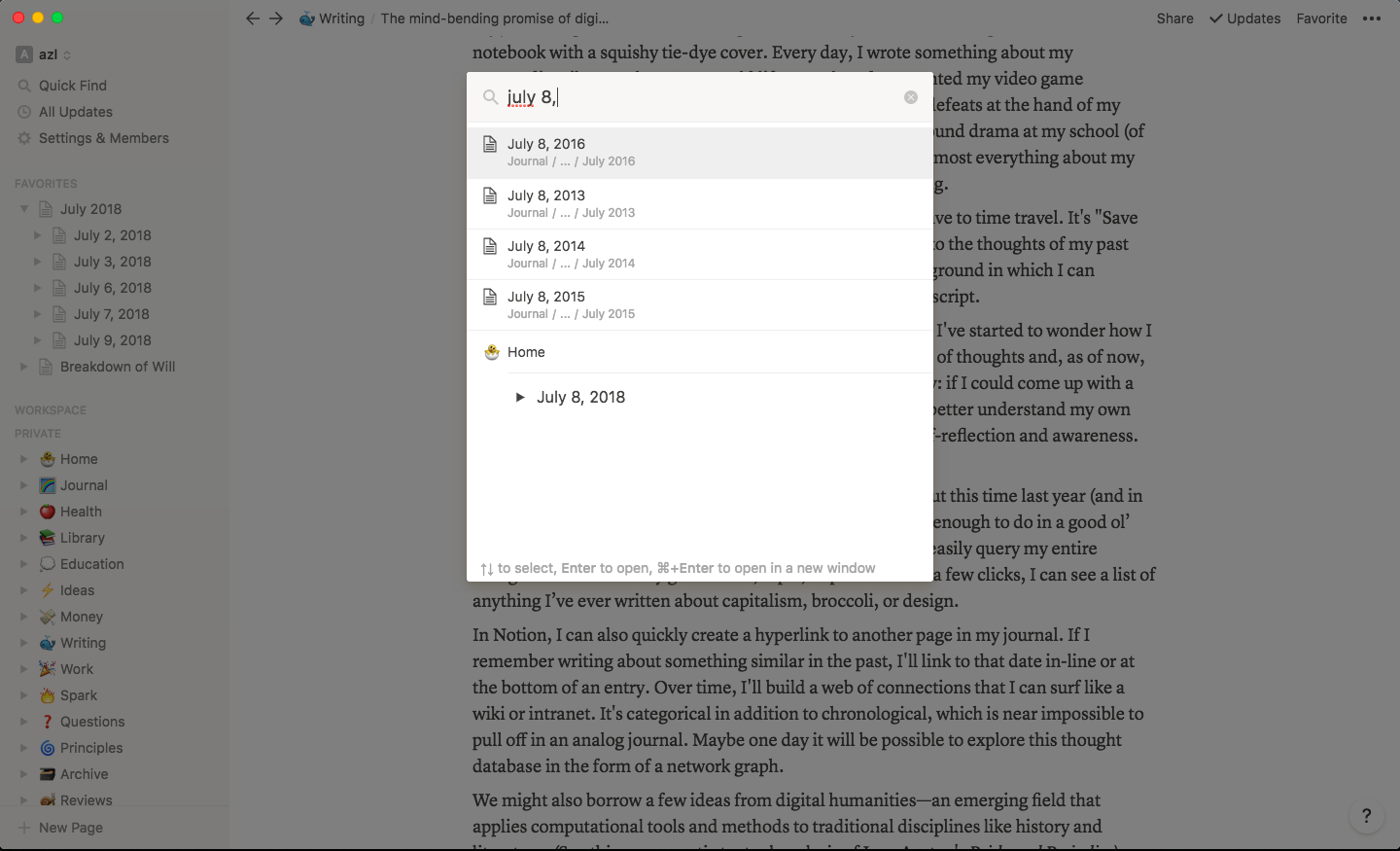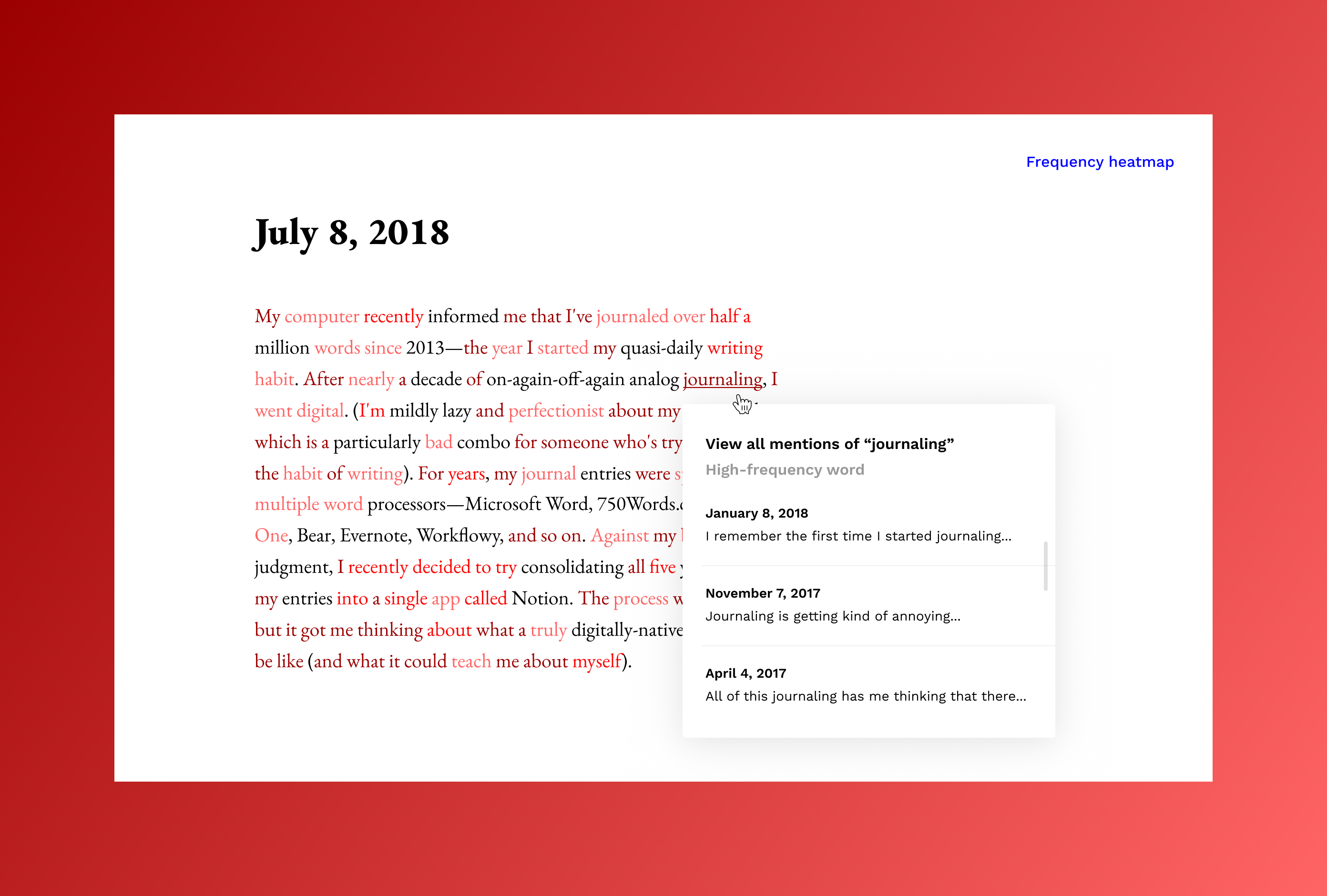Designing a dynamic journal
My computer recently informed me that I’ve journaled over half a million words since 2013—the year I started my quasi-daily writing habit. After nearly a decade of on-again-off-again analog journaling, I went digital. (I’m mildly lazy and perfectionist about my handwriting, which is a particularly bad combo for someone who’s trying to get in the habit of journaling). For years, my journal entries were spread across multiple word processors and apps. Against my better judgment, I recently decided to try consolidating all five year’s worth into a single app called Notion. The process was a little onerous, but it got me thinking about what a digitally-native journal could be like—and what it could teach us about ourselves.
My journaling habit started in 4th grade, when my school librarian gave me a fat notebook with a squishy tie-dye cover. Every day, I wrote something about my extraordinarily complex 10-year-old life. Mostly, I documented my video game successes and failures—new levels and weapons unlocked, defeats at the hand of my arch-enemies, etc. Almost everything about my life has changed since then, but I’ve never stopped journaling.

As far as I’m concerned, journaling is the closest thing we have to time travel. It’s a time capsule for the mind and a space in which you can discover your unknown unknowns. It’s the only thing that allows you to return to the thoughts of your past self, undistorted by your experience in the present. It takes you off script.
(If you’ve never journaled before, here’s a little space to try it out. Just write a few words about what’s been on your mind today):
And we’re back. Now that I have over half a million words stored in Notion, I’ve started to wonder how I could make sense of them. (And if I should even try). It’s a massive collection of thoughts and, as of now, it’s pretty impenetrable—a territory without a good map. My theory: if I could come up with a useful interface to this collection of thoughts, maybe I’d be able to better understand my own habits of mind and create an interesting tool for self-reflection.
Know thyself
For starters, Notion’s search feature makes it easy to know what I was thinking about on this day in history. This is easy enough to do in a good ol’ paper journal. But I can also query my entire collection of thoughts for any given word, topic, or phrase. With a few clicks, I can see a list of anything I’ve ever written about capitalism, broccoli, design, etc.

I can also use Notion to quickly add a hyperlink to another page I’ve created. For example: I keep notes on books in Notion, and I often find myself linking to them when I write in my journal. Over time, I’ll build a web of connections that I can surf like a wiki or intranet. It’s categorical in addition to chronological, which is near impossible to pull off in an analog journal. Maybe one day it will be possible to explore this thought web in the form of a network graph.
A dynamic journal might also borrow a few ideas from digital humanities—an emerging field that applies computational tools/methods to traditional disciplines like history and literature. (See this programatic textual analysis of Pride and Prejudice). The collision of linguistic analysis and digital journaling can spark a lot of interesting questions like: Are you writing mostly about the past, present, or future? Are you writing mostly about yourself or others? Which words appear most often in your writing? Which topics most often appear together? What can you predict about the content of a specific journal entry given a particular keyword or phrase? How does the “popularity” of a given topic vary over time? It’s like Ngrams for the mind.
First we shape our tools
So far, we’ve explored what it might be like to consume a digital journal. What’s more interesting is how it might change your thought process—the habits of mind that influence how you think and create. This isn’t as far-fetched as it might sound. Just as the human body evolved in response to environmental constraints, our thought patterns evolve in response to the thinking tools we create. Douglas Engelbart, an early pioneer in the field of software design, wrote a manifesto in the early 1960’s about how the computer would influence human intellect. Here’s an excerpt about what it was like to use a word processor for the very first time:
You are quite elated by this freedom to juggle the record of your thoughts, and by the way this freedom allows you to work them into shape. You reflected that this flexible cut-and-try process really did appear to match the way you seemed to develop your thoughts … So far the structure that you have built with your symbols looks just like what you might build with pencil-and-paper techniques—only here the building is so much easier when you can trim, extend, insert, and rearrange so freely and rapidly.1
As a digital native, it’s hard for me to imagine writing without the convenience (crutch?) of the backspace key and copy/paste. But to Engelbart and his contemporaries, the word processor was mind-blowing. His manifesto made me realize that handwritten thoughts are different from typewriter thoughts are different from Microsoft Word thoughts are different from Notion thoughts. I’ve obviously written things on paper before, but always with the assumption that they’ll graduate to the digital world where I can easily mold and manipulate them. The word processor gave us the freedom to juggle the record of our thoughts, which has in turn shaped the way we think.
As we may journal
What next? What if our writing software felt more alive and dynamic? Less like the static, blank canvases of the analog world. “So much of the way we work with systems today is derived from the pencil and paper medium. Even when we’re working on the computer, we’re still thinking in pencil and paper. And I think this is an incredible opportunity now to rethink how we think about systems.”2 What if you could learn more about yourself while you’re in the process of writing? What if you could create some sort of feedback loop between everything you’ve written in the past and the things you’re writing about in the present? It’s hard to say exactly what this would look like, but I have a few vague ideas.
Frequency heat map. As you write, the words change color (or size) to indicate how often you’ve used them in the past. You can better understand which ideas are new and which are well-trodden paths.
See also. When you type a phrase that looks familiar, you see some information about the contexts in which you’ve used it in the past. I can’t tell you how many times I think I’ve come up with a good idea, only to find that I’d already written about it years before. A feedback loop between what you’re writing in the present and what you’ve written in the past would help to make sure that you’re building on your ideas rather than repeating them.

Predictive text. A model trained on your thought collection could try to predict what you’re going to type next. Typing in your dynamic journal could feel like brainstorming with your past selves.
Space as time. As we know them today, digital documents have a way of flattening time. In a dynamic journal, the spacing between sentences and words could be made to reflect the amount of time you paused between them. It’s a way of visualizing the passage of time and understanding how much thought went into each word.
To some of you, this might seem like overkill at best, egomania at worst. I certainly don’t think we can turn self-awareness into a data science problem, and I’ve watched enough Black Mirror to know that we shouldn’t try. A dynamic journal is just one tool of many that people might use for self-reflection. It doesn’t provide any answers or prescriptions, but it might help you ask some interesting questions. The invention of the data graphic in the 1700s revolutionized the way we understand complex systems. The invention of cartography changed the way we understand our place in the world. Representations matter because they shape perception. Dynamic journaling is a way of representing thoughts that might help us understand ourselves just a little bit better. If nothing else, it makes for an interesting thought experiment.
-
Douglas Englebart, Augmenting Human Intellect↩
-
Bret Victor, Media for Thinking the Unthinkable↩